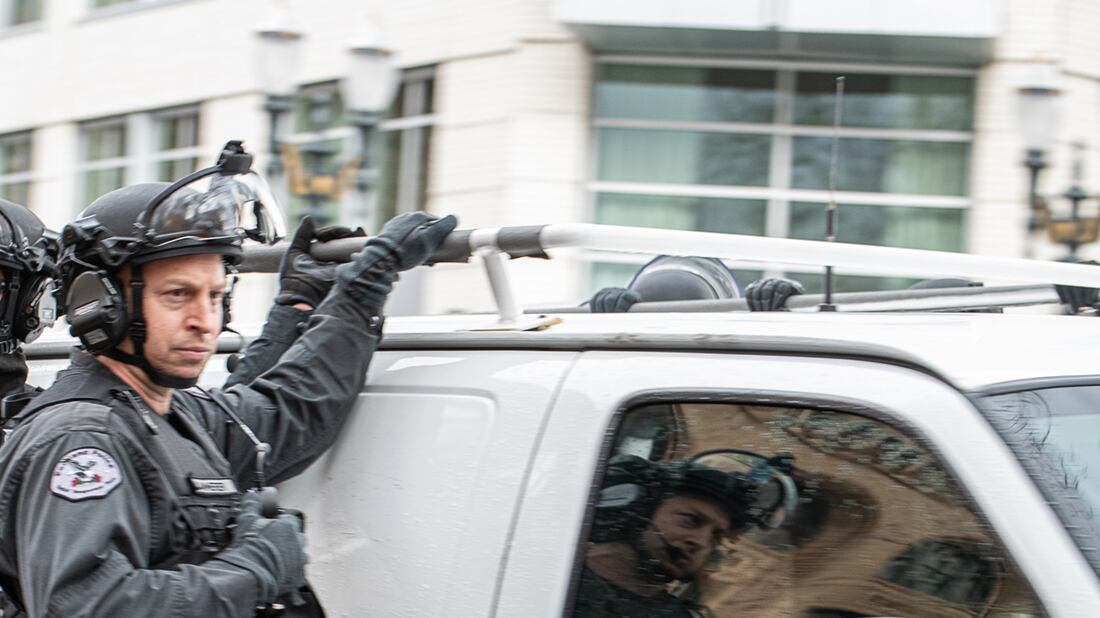A Portland police officer under investigation for allegedly using excessive force during protests has a puzzling assignment: He's a lead detective on last week's shooting of a Portland man by U.S. deputy marshals.
The officer who's both being investigated and leading an investigation? Detective Erik Kammerer, whom three eyewitnesses identified to WW in October as "Officer 67," the cop who hit a Black homeowner in the head Sept. 5 and shoved at least three other people at protests this year.
Mayor Ted Wheeler's office confirmed the officer wearing that number has been removed from the Rapid Response Team, the unit that polices protests. City officials won't formally confirm Kammerer's identity, and he continues to perform his other duties.
Those duties include investigating homicides and shootings by police officers. Court records show Kammerer has played a key role for at least a decade in grand jury proceedings to determine whether other police officers were justified in using deadly force.
His latest assignment? On Dec. 8, the U.S. Marshals Service announced Kammerer is one of two detectives who will investigate the wounding of Jonathan Crowley, 31, by deputy marshals in North Portland. Portland police confirmed to WW that Kammerer is one of the lead detectives on the case.
In other words, a police officer who was removed from street duty because of allegations he used too much force will help determine whether another cop was justified in pulling the trigger in a recent shooting.
Longtime critics of the Portland Police Bureau say that's outrageous.
"There's no reason why you need to put a detective on a serious case where stakes are very high when there's smudge marks on his record," says Jesse Merrithew, a criminal defense lawyer in Portland who has observed Kammerer's previous testimony.
City Commissioner Chloe Eudaly, who is departing City Hall next month after losing a reelection bid, agrees.
"Personnel protocols in the Portland Police Bureau are woefully inadequate. Removal from street duty is not—in my opinion—a satisfactory response to Detective Kammerer's well-documented violence toward protesters," Eudaly tells WW. "I hope that the next council is able to solve the contractual barriers to police accountability that we currently face through the upcoming police contract negotiations."
Wheeler, Commissioner Jo Ann Hardesty, and the Police Bureau all declined to comment. Kammerer has not responded to requests for comment on this story or previous stories about him.
A review of court records shows that Kammerer, a 26-year veteran of the bureau with an annual salary of $112,881, is not merely a riot cop whom protesters say they avoid. He plays a key role in Portland criminal justice—both in the city's response to demonstrations and in the legal consequences for fellow officers who kill.
Kammerer is a squad leader of the bureau's Rapid Response Team, court records show. That means, until WW's story last month, Kammerer was in charge of commanding 10 to 15 officers on the team's "Delta Squad," instructing them to deploy tear gas and other riot control munitions. He also served as an intel officer on the bureau's Special Emergency Reaction Team, at least until 2019. (It is unclear whether he is still assigned to SERT.)
"As a Squad Leader I am charged with ensuring life safety, allowing and protecting free speech, protecting critical infrastructure and preventing property damage, including subsequent looting," Kammerer wrote in a July 4 declaration submitted on behalf of the Police Bureau in a federal lawsuit.
Kammerer has been a homicide detective for the bureau since 2007. That job includes responding to the scene of murders and interviewing witnesses. And it means Kammerer has played a role in exonerating police officers who fatally shot Portlanders. He has regularly been called as an expert witness in Multnomah County grand jury proceedings dating back to at least 2010.
Court records indicate Kammerer has testified in grand jury proceedings for several fatal high-profile officer-involved shootings, including those of Aaron Campbell, Keaton Otis, Quanice Hayes and Andre Gladen.
In some of those proceedings, Kammerer provided testimony that may have contributed to officers' exoneration.
For example, Kammerer gave expert testimony to explain why the officer who fatally shot 17-year-old Quanice Hayes didn't see his gun lying in the grass a few feet away.
On Feb. 9, 2017, Hayes was shot three times by Officer Andrew Hearst while surrounded by at least five officers who were responding to an armed robbery call. All officers present at the time of the shooting said they did not see the tan gun found a few feet away from Hayes after Hearst shot him.
Kammerer defended those officers by saying that because none of the officers saw it before Officer Hearst fired, the gun, to Kammerer's belief, must have fallen out of Hayes' pants after he was shot and that Hayes was reaching for it when Hearst fired.
"Based on the fact that nobody saw that gun there until afterwards, that's why I believe that he had it on him and was in the act of retrieving it at the time that he was shot," Kammerer said, according to grand jury transcripts.
Portland attorney Ashlee Albies, who represented Hayes' family in a lawsuit against the city of Portland, says Kammerer's testimony was memorable.
"I remember being very surprised at his testimony," Albies says. "It's not based on expertise, it's based on speculation."
Kammerer also testified in the grand jury proceedings for the shooting death of Andre Gladen, who was shot by Officer Consider Vosu on Jan. 6, 2019. Kammerer, who was the primary investigator on the case, testified Gladen had taken a knife from Vosu's vest and—based on a toxicology report—that Gladen had been on methamphetamine at the time of the shooting. Those were important findings in exonerating Vosu.
The Multnomah County District Attorney's Office plans to continue calling Kammerer to testify in future proceedings.
"We will continue to subpoena Detective Kammerer as a witness based upon his current assignment with the Portland Police Bureau," says Brent Weisberg, a spokesman for the DA.
There's no evidence Kammerer's testimony to grand juries has been dishonest. But some Portland lawyers argue that Kammerer's alleged actions during protests should call his judgment into question.
Alex Meggitt, a civil rights lawyer in Portland, says someone like Kammerer, whose impressive résumé is explained to grand jurors at the start of his testimony, plays a crucial role.
"The grand jury will take a police officer's comments on police conduct with a lot of authority," Meggitt says. "It's an issue if the person presenting that evidence to the grand jury is someone who routinely uses an unreasonable level of force or does not follow those regulations."
Merrithew puts it more starkly.
"For an officer-involved shooting, he has displayed his bias on the street," he says. "The public knows exactly where he stands. In my view, he has no credibility to say a police shooting was justified or not."


